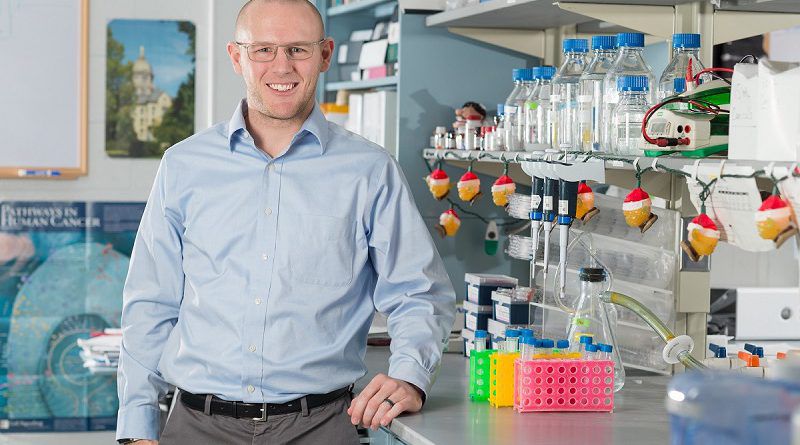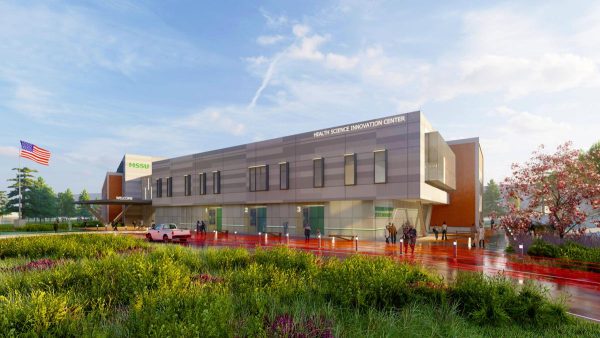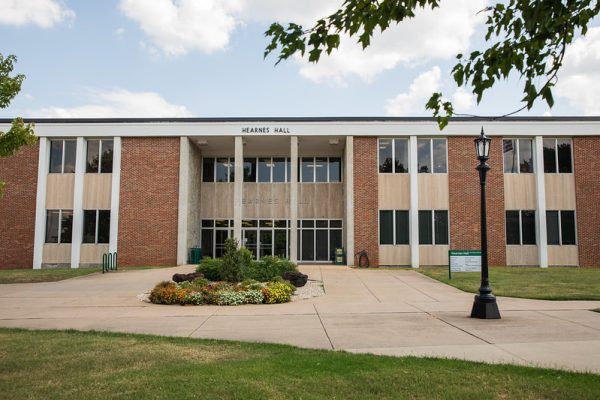Missouri Southern Grad making headway with cancer research
Doctoral Student Josh Mason doing research in a laboratory on the campus of the University of Notre Dame in South Bend, Indiana.
Cancer is a disease that touches all our lives in some way. However, one Missouri Southern Graduate and current doctoral candidate at the University of Notre Dame is doing his part to find a cure.
Southern alumnus Joshua Mason presented his research at the National Graduate Student Symposium (NGSS) last month from March 20-24, at St. Jude’s Research Hospital in Memphis, Tenn.
Selection in the NGSS is extraordinarily competitive as application is by invitation only. Over 1,500 students were invited to apply for the 2017 symposium of which only 42 students,
According to doctors, 90 percent of cancer-related deaths are due to metastatic cancer, a type of cancer where cells break away from where they first formed (the primary cancer), and travel through the blood or lymph system, and form new tumors (metastatic tumors) in other parts of the body. This process is known as metastasis.
Mason believes he may have discovered a way to eliminate these traveling cancer cells.
His findings show that a unique protein, otherwise known as SGK-1, is required for energy production in multiple different cancer types. Take away that energy production of that protein and the cells can’t spread.
This incredible finding means that SGK-1 may act as a master regulator for ATP generation and survival of metastatic cancer cells and may serve an efficacious therapeutic target to specifically eliminate metastatic cancer cells.
Mason says that other studies suggest that targeting SGK1 may be one way to shut down the energy production ability of the most aggressive cancer cells, thereby helping patients with cancer.
Despite this amazing breakthrough, Mason says there’s still a long way to go and that there’s a lot that researchers still don’t understand about cancer. However, this shows progress is being made and that doctors and scientists are understanding key factors that drive a tumor’s progression.
The National Graduate Student Symposium is held each spring on the St. Jude campus in Memphis. The competitive events offer an opportunity for students to present their work while learning about the exceptional research and facilities at St. Jude.
Founded in 1962, the mission of St. Jude Children’s Research Hospital is to advance cures, and means of prevention, for catastrophic pediatric diseases through research and treatment. All children are able to receive treatment, regardless of a family’s ability to pay for the medical services.
Mason believes that his participation in the symposium will act as a catalyst to his career progression.
“It indicates that I can perform, analyze, and communicate quality science with leaders in the scientific community.”
Mason graduated summa cum laude from Southern in 2013 with a bachelor’s degree in biochemistry. He was named an outstanding graduate in Southern’s Chemical and Physical Sciences Department and was an Honors Program graduate.
Mason and his wife, Marcie, who graduated from Southern in 2013 with a degree in education, currently live in South Bend, Ind., while he finishes his degree at Notre Dame.
Your donation will support the student journalists of Missouri Southern State University. Your contribution will allow us to purchase equipment and cover our annual website hosting costs.






























